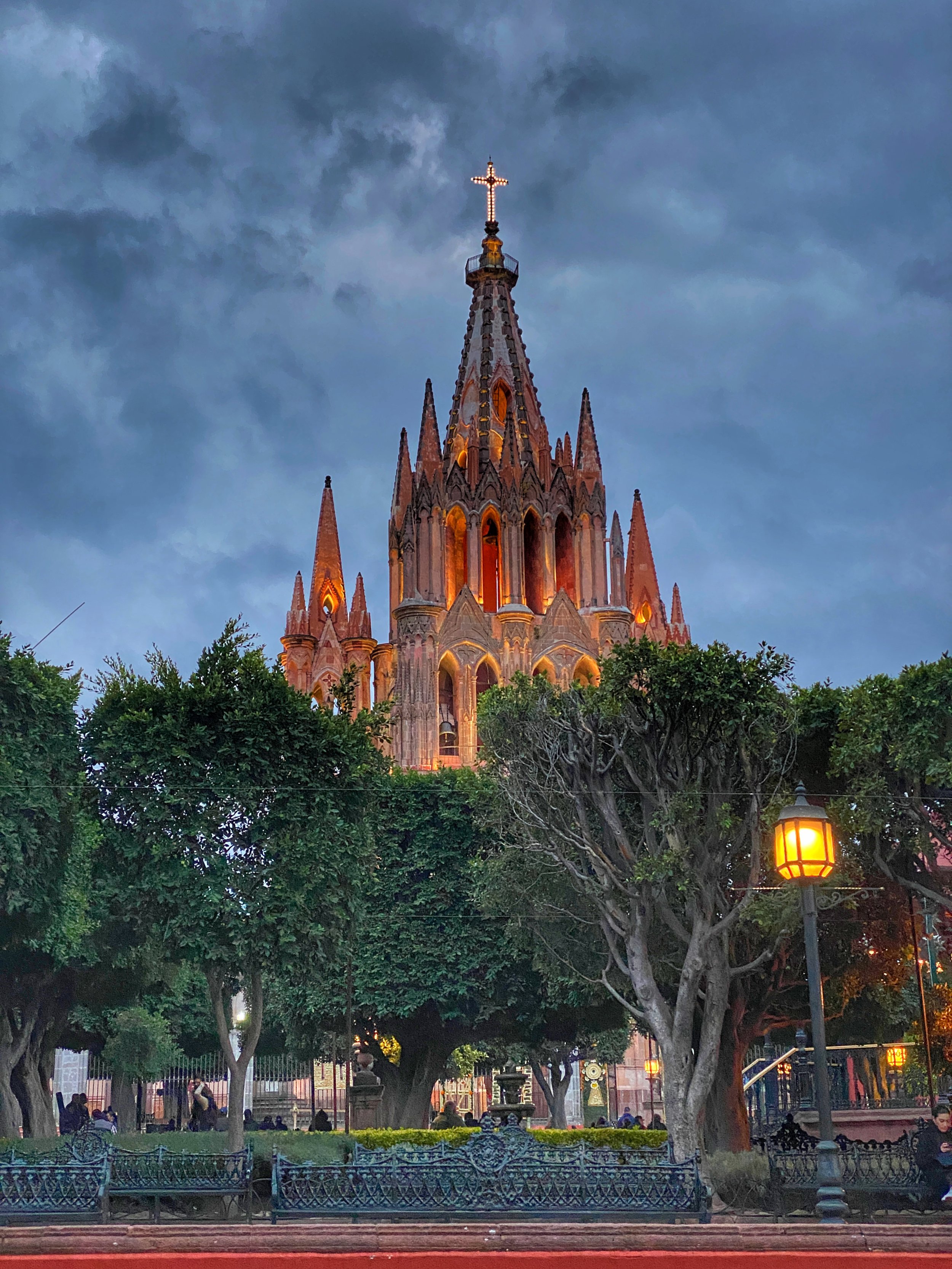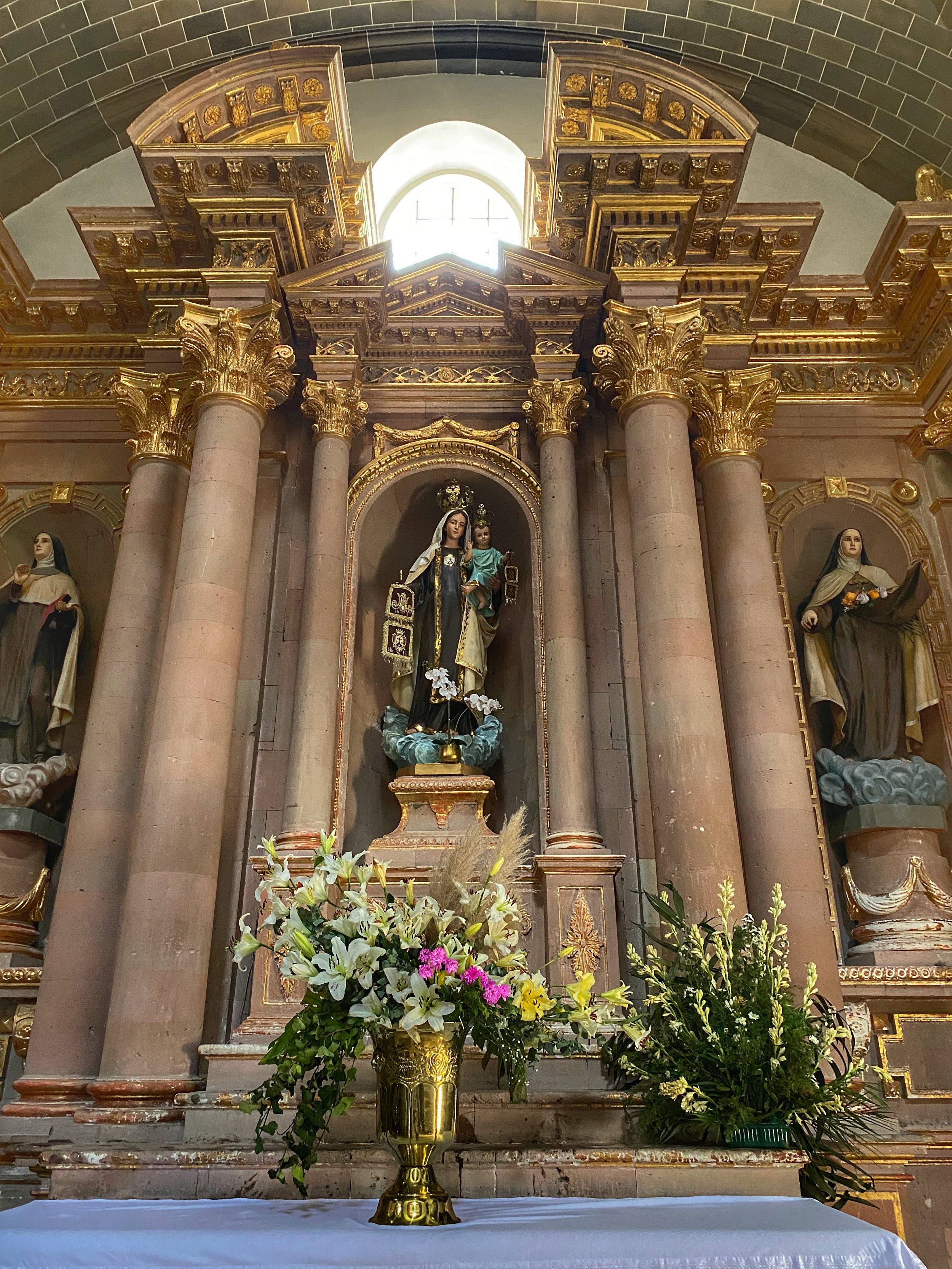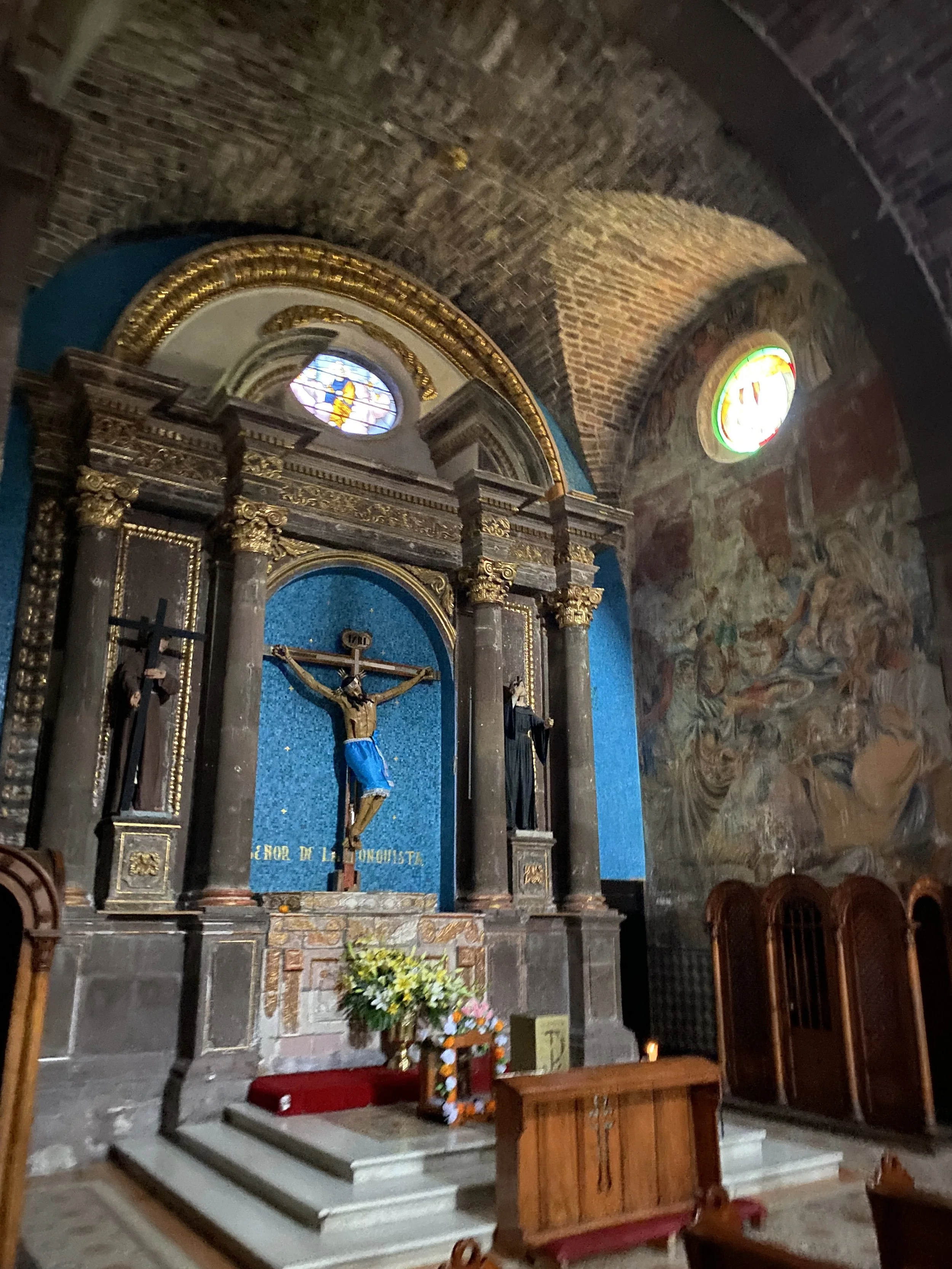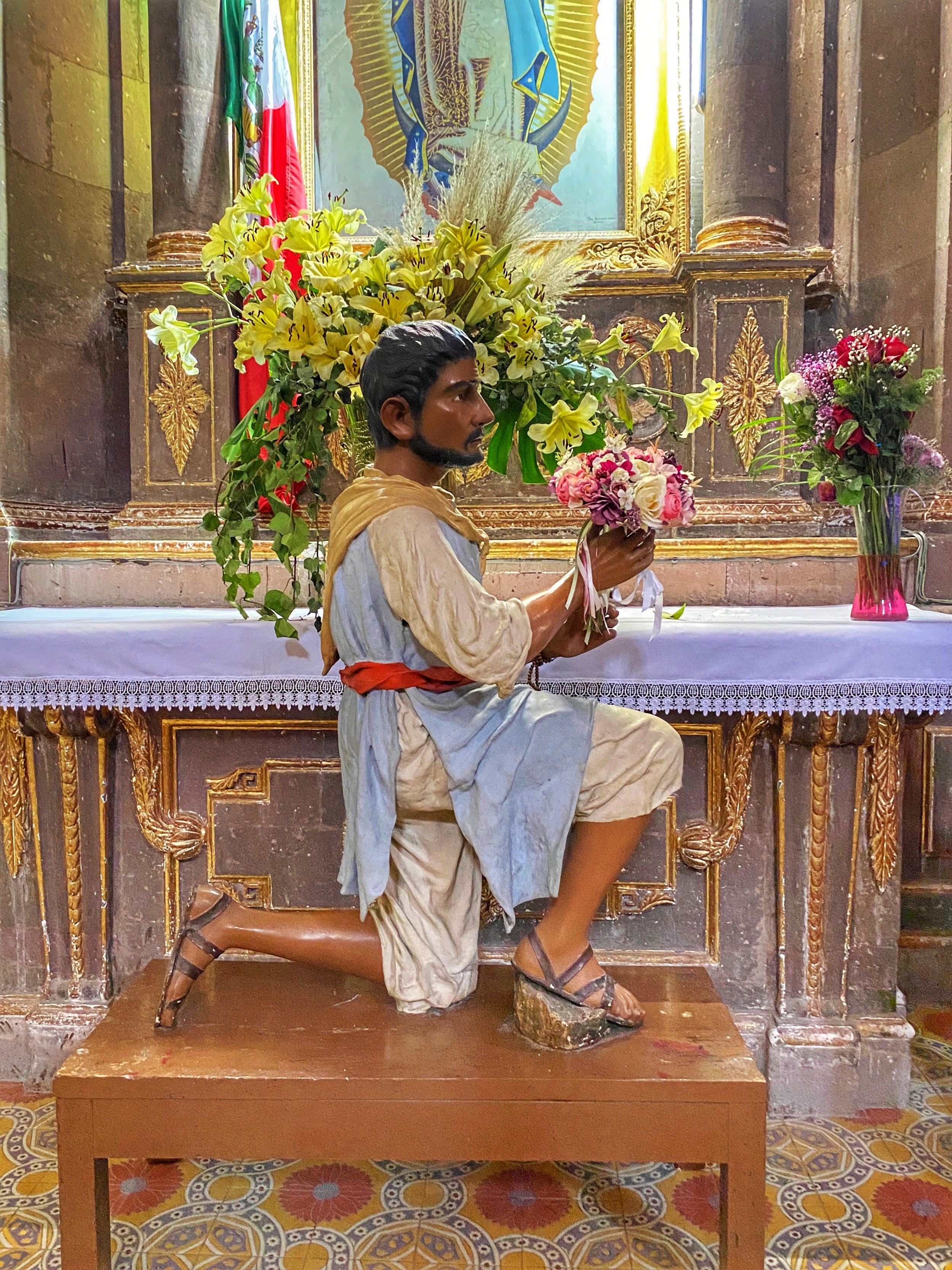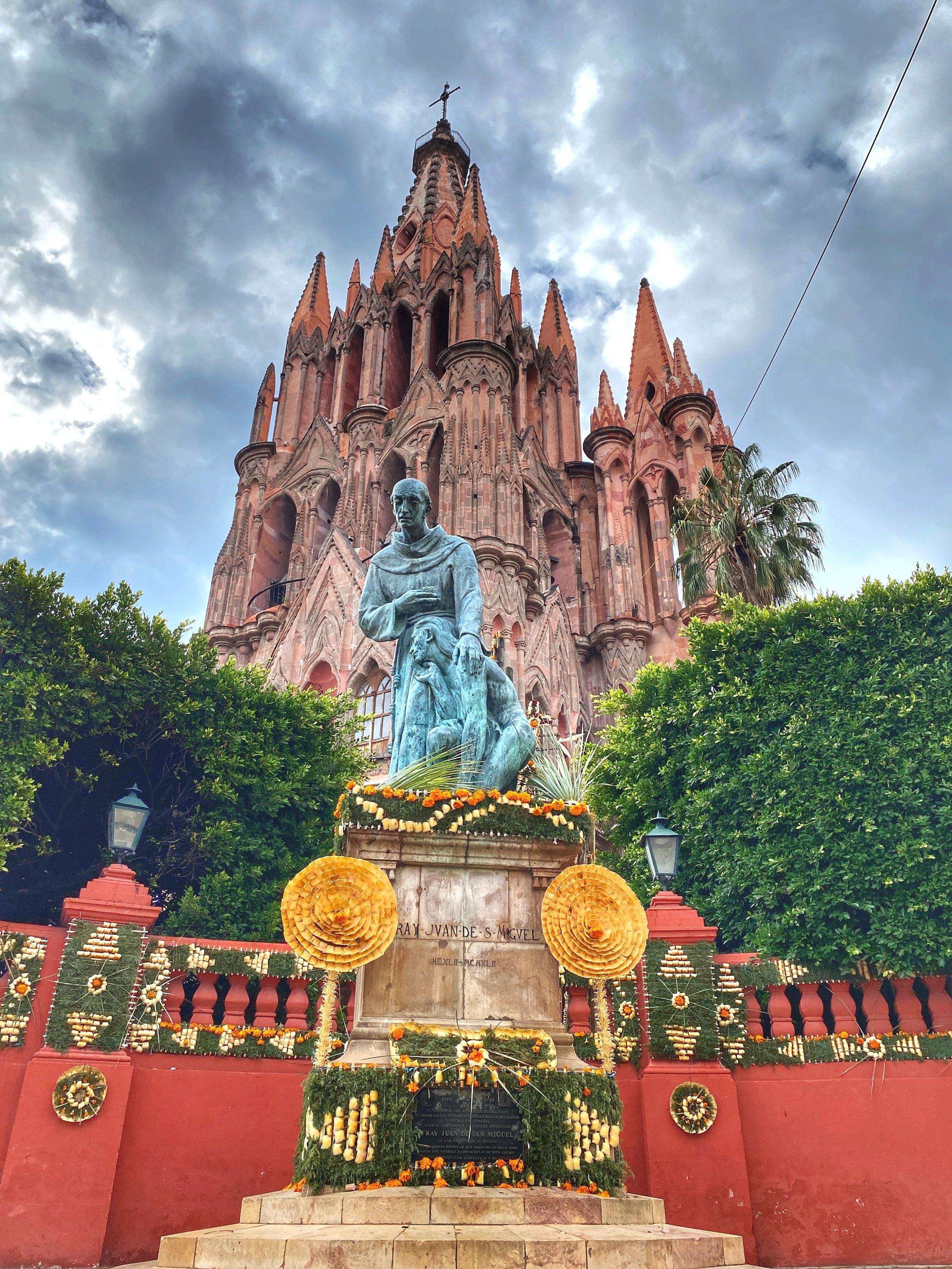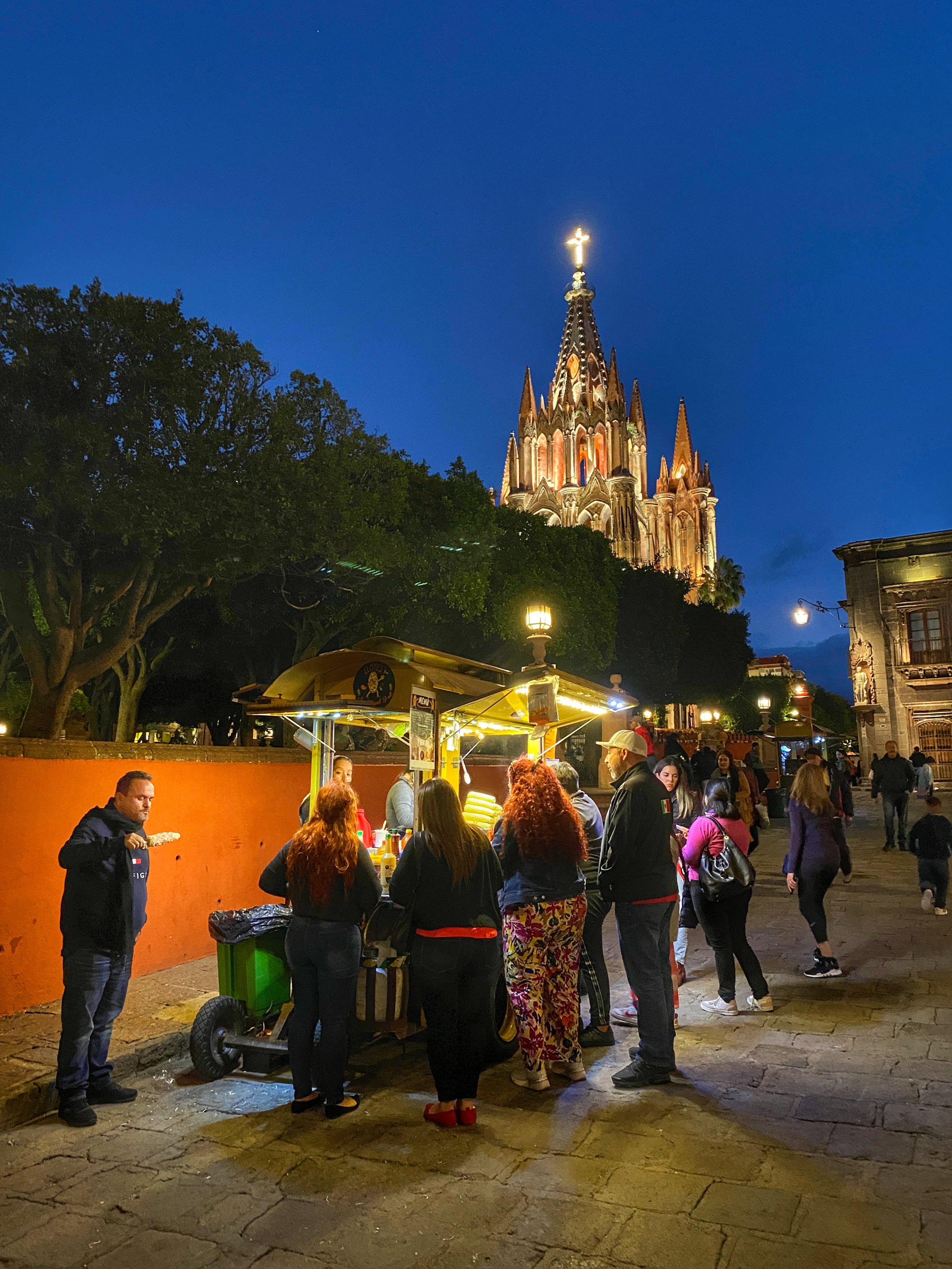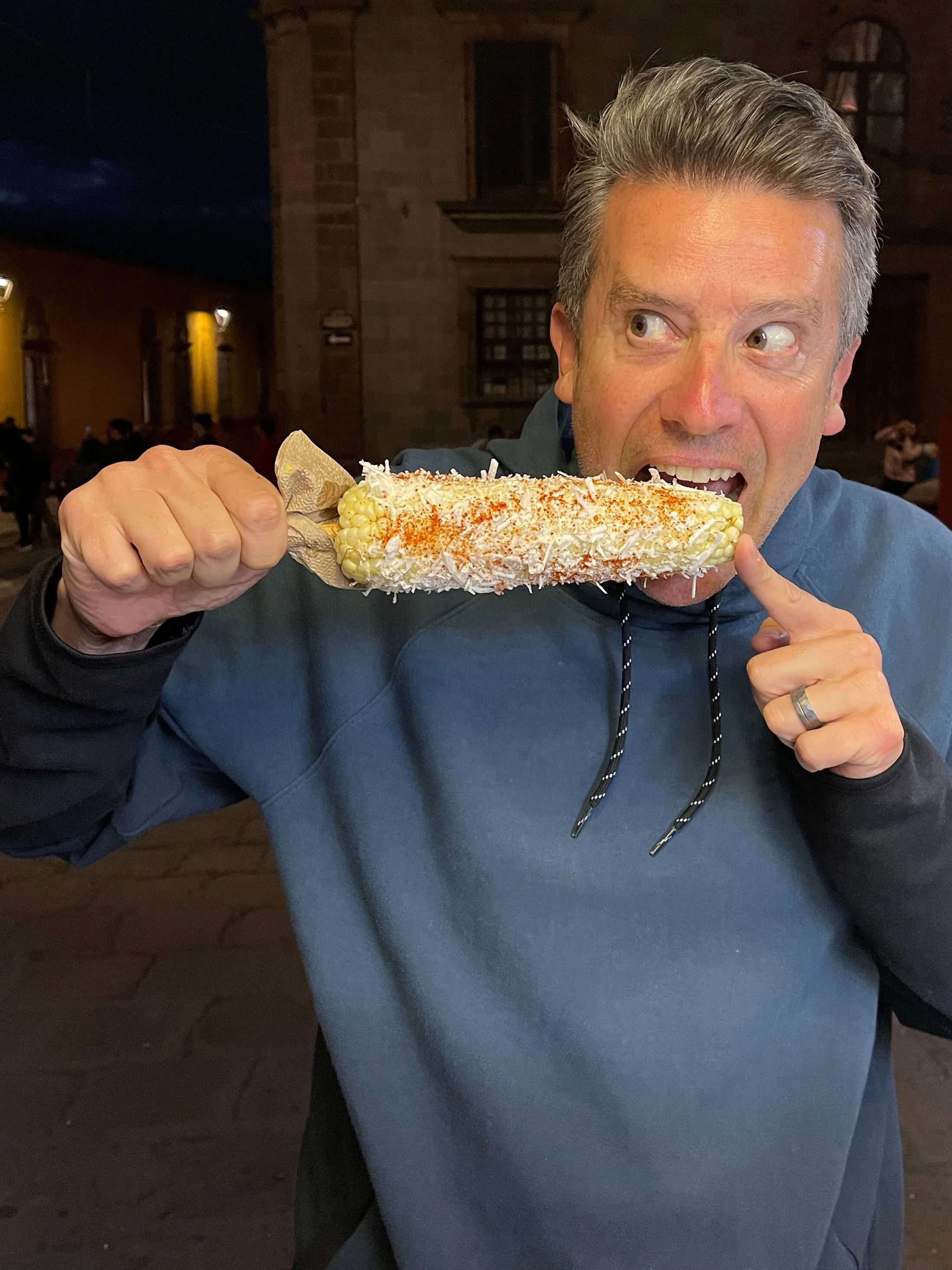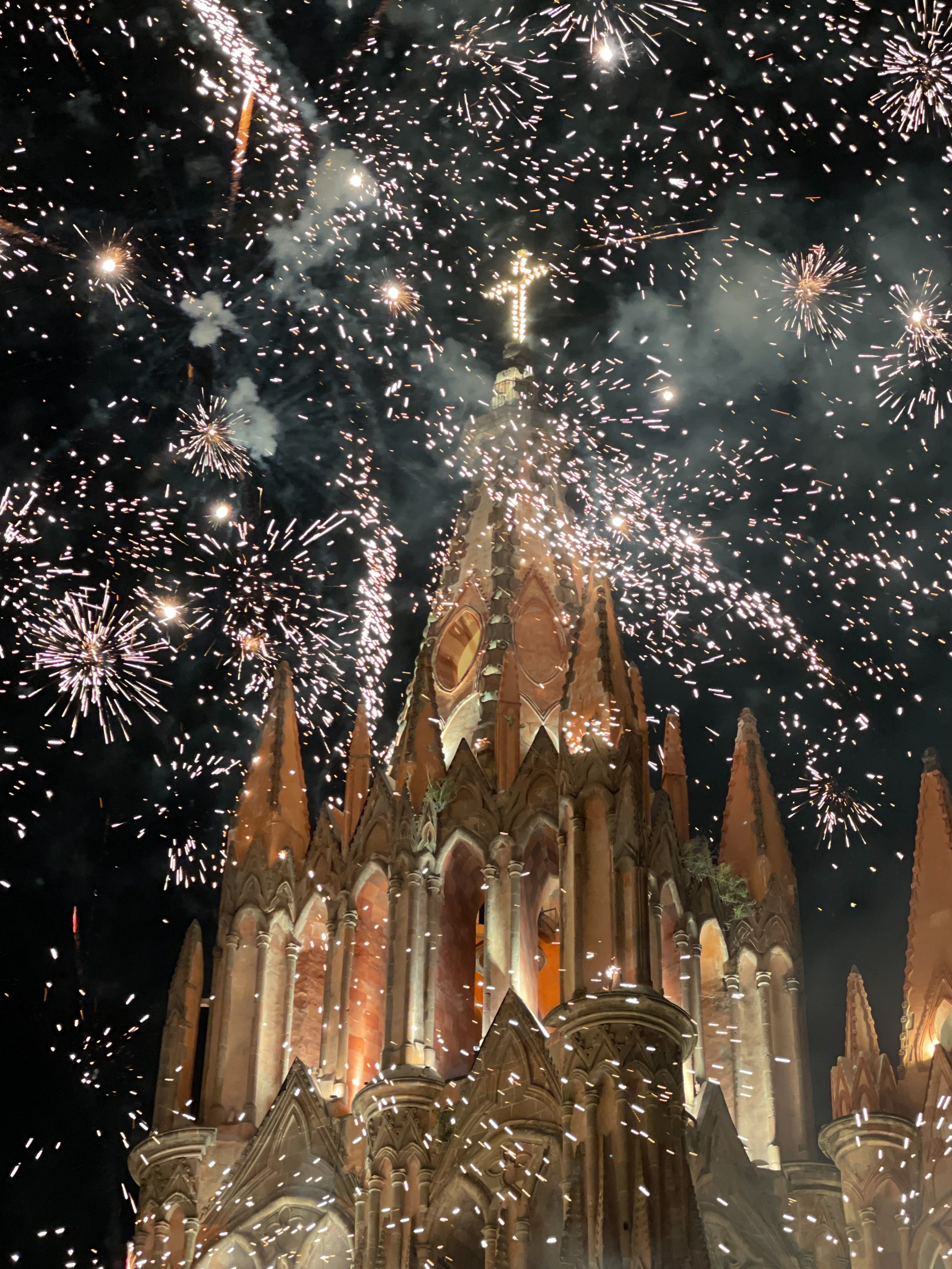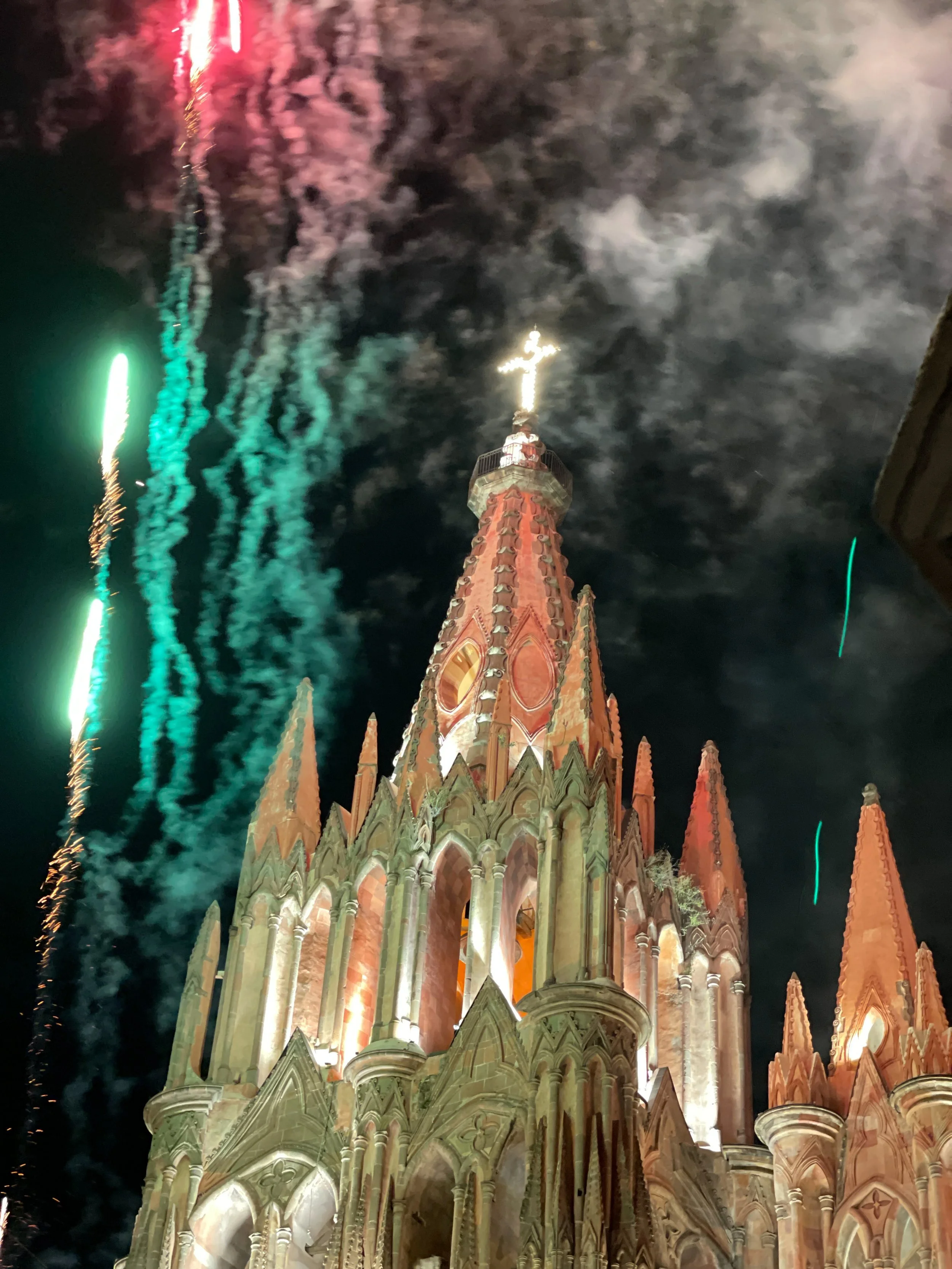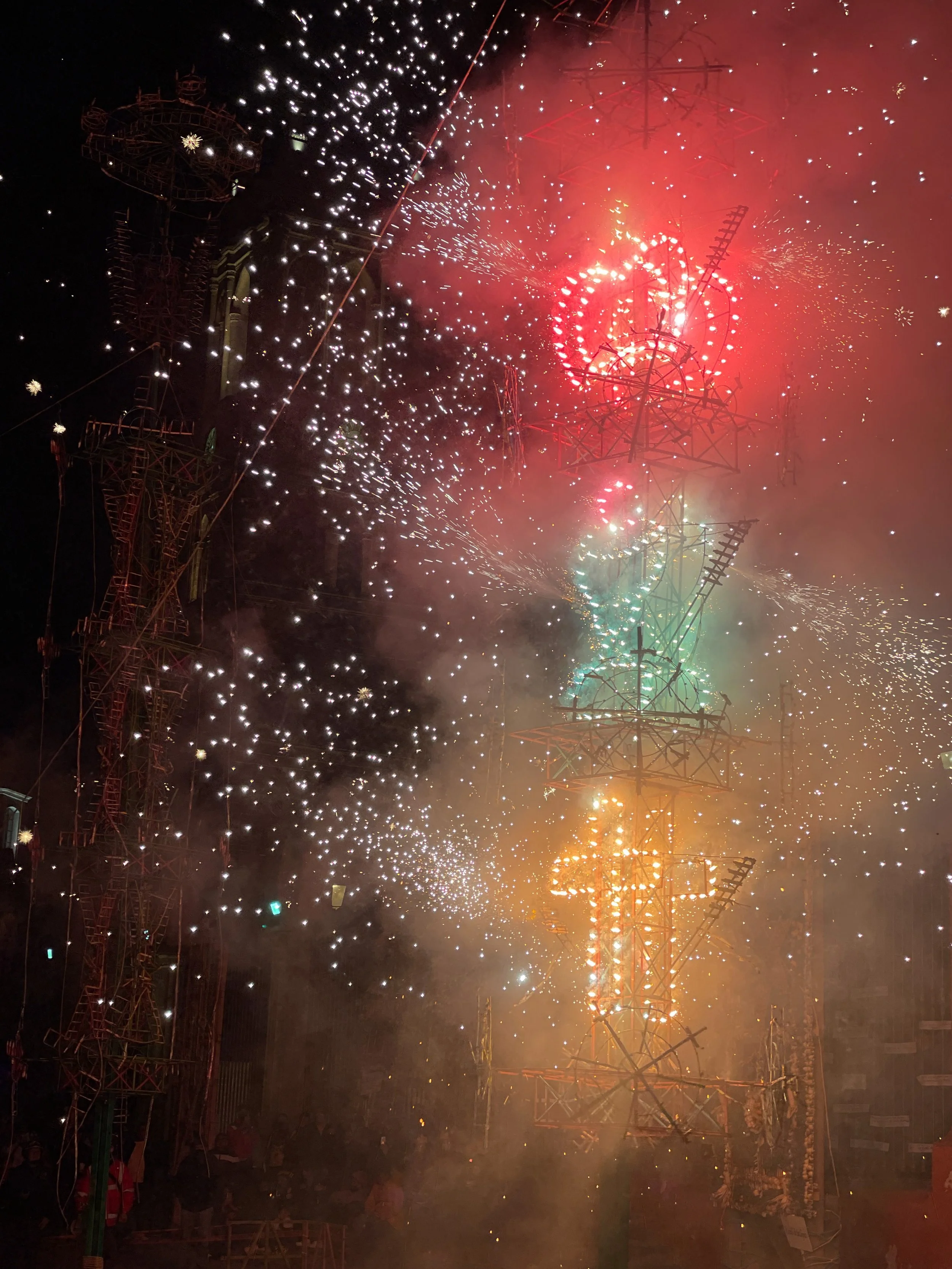Discover the strange history of this iconic church, the lively Jardín it overlooks and the riotous Festival of San Miguel.
Parroquia San Miguel Arcángel, an icon of San Miguel de Allende, Mexico
“It’s just like the Disney Castle!”
It’s a refrain you’ll hear often when you show pictures of the iconic church in San Miguel de Allende. Only, for my money, it’s cooler, cuz it’s pink — and I’d much rather be in Mexico than Disney World.
“The church was designed by a self-taught indigenous stonemason named Zeferino Gutiérrez, who was inspired by a postcard of a Belgian church.
Apparently, Gutiérrez had never seen a cathedral in person, so he just winged it, scratching his design in the sand with a stick. ”
You’ll never tire of seeing the Parroquia San Miguel Arcángel (they really need to come up with a solid nickname). And the good news is, almost every time you head out to explore the charming colonial town, you’ll find yourself passing by the church and the main square, known locally as el Jardín.
Behind the church is a quaint cobblestone street.
A Towering Legacy: Construction of San Miguel’s Most Famous Landmark
The exact date of construction is a matter of debate. There’s a convoluted history on the church’s website, stating that the first iteration was in 1564 — while others believe it wasn’t completed until the 1700s. The church has undergone so many renovations and additions over the years that it’s difficult to discern what the original structure looked like.
Perhaps all those renovations is why San Miguel Arcángel is a delightful mishmash of different architectural elements. The exterior features a Neo-Gothic façade that was added in the late 19th century, while the underlying structure is more Mexican Baroque.
San Miguel de Allende is for lovers.
But let’s face it: The real stars of the show are the towering spires. They’re the stuff of legend, designed by a self-taught indigenous stonemason named Zeferino Gutiérrez, who was inspired by a postcard of a Belgian church. Apparently, Gutiérrez had never seen a cathedral in person, so he just winged it, scratching his design in the sand with a stick.
Whatever the case, the end result is magical — he created those fantastical, otherworldly spires that look like they belong in a fairytale.
Part of its undeniable charm is the fact that it’s pink. The stones used in the Parroquia San Miguel Arcángel’s façade are cantera, a volcanic rock likely sourced from nearby quarries. Over time, the stones have taken on a more vibrant shade of pink, winning the hearts of visitors and locals alike.
Duke sits on the steps at the side of the church.
The church sort of leans to one side, which has led to various theories about how it came to be that way. Some say it was built askew on purpose to ward off evil spirits or to align with the position of the sun. Others attribute its slant to an earthquake or even the Devil himself. In reality, the tilt is likely due to the sandy soil San Miguel Arcángel was built on, which has shifted over time. This natural phenomenon is known as subsidence and is a common problem in many parts of the world.
In recent years, efforts have been made to stabilize the church and prevent further subsidence. However, the tilt remains a distinctive feature of the Parroquia San Miguel Arcángel and adds to its unique character and charm. Hey, it worked for that Tower of Pisa.
The Parroquia San Miguel Arcángel has seen some violence over the years.
The Cristero War and the Parroquia San Miguel Arcángel
The San Miguel Arcángel parish has seen some real action over the years. For one thing, it was witness to the bloody Cristero War of the 1920s. This violent conflict pitted Catholic rebels against the anti-clerical government of Mexico, with both sides fighting tooth and nail for their beliefs. San Miguel Arcángel wasn’t spared from the brutality — bullets and bombs left the church’s walls scarred and pockmarked. In addition, some of the priests of San Miguel Arcángel were killed or exiled during the conflict.
The church was later repaired, a testament to the resilience of the locals and a symbol of Mexican history and faith.
The interior of the Parroquia San Miguel Arcángel didn’t go entirely as planned.
A Work in Progress: The Interior of Parroquia San Miguel Arcángel
While I’m utterly smitten with the whimsical exterior of the Parroquia San Miguel Arcángel, the interior ain’t too shabby, either. It also features a variety of architectural styles, including Gothic, Baroque and Neoclassical. The high ceilings and intricate details create a sense of grandeur and awe. The main altar is adorned with gold leaf and features a statue of San Miguel, aka Saint Michael the Archangel, the church’s namesake.
Wally thinks this would be a great place to propose to someone.
Off to the side is a smaller chapel adorned with surprisingly modern murals that look Cubist.
A chapel in the back corner of the church has a Cubist-esque mural showing indigenous Mexicans on one side and Catholic monks on the other.
As impressive as the interior is, though, it’s not quite finished — or what was first intended. In fact, the original plans for the interior were much more grandiose, but due to a lack of funding and resources, many of the ideas were never fully realized.
On the side of the church is a statue of Fray Juan de San Miguel, who founded the city and was, in turn, named for Saint Michael the Archangel.
Saintly Swordsman: The Legend of San Miguel
So who exactly is the archangel the church is named for?
Well, with a name like Miguel, which means “Who Is Like God,” it’s not surprising that he’s the commander of the heavenly host. He’s often depicted with a sword, ready to do battle against Satan and his minions.
San Miguel is also the patron saint of police officers and soldiers.
Plaza Allende, commonly known as the Jardín, is the bustling center of this charming colonial town.
The Heart of San Miguel: Exploring the Jardín, the City’s Vibrant Central Park
Parroquia San Miguel Arcángel overlooks the main town square, the Jardín, formally known as Plaza Allende. This lively square is the beating heart of San Miguel de Allende. If you’re looking to people-watch, hear a mariachi band, pose with the giant puppets called mojigangas or grab some street food (we had elotes one night that were delicious), this is the place to be.
Dancing by the gazebo
A mariachi trumpeter
Mariachi bands entertain the crowds in the plaza in front of the church.
The Jardín is situated right in the center of town, which makes it a prime location for all sorts of festivities and events. It’s flanked by the church on one side, and rows of shops and restaurants on the others, so there’s always something to see and do.
Grab dinner at the elote stand.
Wally digs into his elote.
But the Jardín wasn’t always the lovely green space it is today. In fact, it used to be a marketplace where vendors sold everything from produce to livestock. It wasn’t until the early 20th century that the town decided to convert it into a park, complete with benches, a gazebo and trees that have been trimmed into circles.
If you can, time your trip to coincide with the Feast of San Miguel at the end of September.
Feast of San Miguel and the Crazy Castillos of the Town’s Biggest Fiesta
Duke and I happened to be in SMA during the Feast of San Miguel — but, as odd as it might sound, no one told us about it! Thank God we happened to be walking through the Jardín and noticed that they were erecting wooden scaffolds in front of the church.
We looked at a flyer pasted to the wall that listed local events. Lo and behold, it was none other than the town’s biggest frickin’ festival!
There was a café on the corner we’d been wanting to check out, so we popped in there and got some drinks while we waited for the festivities to begin.
The week-long Festival of San Miguel, aka La Alborada, takes place around September 29, the saint’s feast day, usually culminating on the following weekend.
The festival’s firework show was the most impressive we’ve ever seen — in part because of the gorgeous backdrop of the church spires.
And what a festival it was! A crowd gathered in front of Parroquia San Miguel Arcángel, and mariachis played their tunes. But the pièce de résistance were the castillos, those towers we had seen, rising up like giant matchstick sculptures in front of the church.
Local craftsmen build these towering infernos, using skills and techniques that have been passed down through generations. It’s truly a sight to behold.
The castillos are a wonder to behold.
When they’re lit, stand back — and let the sparks fly! The pyrotechnicians manning the castillos are like mad scientists, firing off bursts of firecrackers in all directions, painting the night sky above San Miguel Arcángel in a kaleidoscope of colors amid ear-splitting booms. The fireworks on the castillos emit high-pitched wails, spin like Catherine wheels, and form images and words. The whole spectacle was unlike anything we had seen before.
Forget the drawn-out firework shows you see in the States; this was a machine-gun riot of color and explosions — the best we’ve ever seen. A huge grin was plastered on my face, and I’d turn to my neighbors, strangers united by sharing this marvel, and we’d shake our heads and laugh, unable to believe we were witnessing such magic. –Wally
Parroquia San Miguel Arcángel from el Mirador, overlooking the town of SMA
Parroquia San Miguel Arcángel
Principal s/n
Zona Centro
37700 San Miguel de Allende
Guanajuato
Mexico

